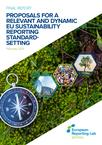Being able to participate in this landmark effort, steering the incredibly rich and valuable contribution from so many committed and talented people representing all possible stakeholders, under the leadership of Patrick de Cambourg, resonates particularly strongly with me. It mirrors both my personal conviction and commitment, but also that of Mazars: that transparency through reliable and faithful information is key to the sustainable and sound development of a fair and prosperous world.
Mazars contributes to collective progress on sustainability reporting
Collective success in reaching Sustainable Development Goals, and delivering on the Green Deal in Europe, cannot be achieved without robust and coherent sustainability data and reporting. The urgent need for relevant, reliable, and comparable sustainability information has prompted the European Commission to take the lead in shaping the future of sustainability reporting in Europe, and possibly globally. The European Commission (EC) stated: “EU sustainability standards are necessary to meet the political ambition and urgent timetable of the European Green Deal. They are also necessary to ensure consistency of reporting rules at the heart of the EU's sustainable finance agenda.”
In June 2020, the EC asked EFRAG (the European Financial Reporting Advisory Group) to advise on the possible way forward for sustainability reporting standardisation in Europe, both from a governance perspective (ad personam mandate) and from a technical perspective (multi-stakeholder Project Task Force mandate).
Both reports contribute to a critically needed improvement in the corporate sustainability reporting landscape, in order to deliver on sustainable commitments. The report ‘Proposals for a relevant and dynamic EU sustainability reporting standard setting’ offers a pragmatic yet ambitious roadmap for the future of European sustainability based on:
- Foundational principles supporting the European agenda and specific goals;
- Practical guidelines inspired by leading international standard-setters;
- A modular architecture allowing for flexibility, while covering all sustainability factors;
- A clear roadmap to delivering sustainability standards in time for the first time application of the revised Non-Financial Reporting Directive; and
- A commitment to work hand-in-hand with current international initiatives to foster better coherence and convergence of sustainability reporting globally.
Maud Gaudry, Director of Sustainability at Mazars, who leads on project management for the multi-stakeholder Project Task Force, comments:
“Being able to participate in this landmark effort, steering the incredibly rich and valuable contribution from so many committed and talented people representing all possible stakeholders, under the leadership of Patrick de Cambourg, resonates particularly strongly with me. It mirrors both my personal conviction and commitment, but also that of Mazars: that transparency through reliable and faithful information is key to the sustainable and sound development of a fair and prosperous world.
“The implications of this report should be long-lasting, offering a strong foundation for better informed investment decisions, and future business success. With further updates from the European Commission expected in April 2021, including the proposed revised Directive, the decisions made will undoubtedly influence the future of sustainable reporting, and the way companies do business both across Europe and further afield.”
She adds: “I am proud to be part of this project, serving the public interest and representing Mazars, ensuring we are at the heart of change and helping businesses move towards a more sustainable future. Sustainability offers opportunities for companies to develop stronger communities, corporate resilience and, ultimately, contribute to the wider public good. It is rightly being taken more seriously than ever – and we see that reflected in regulators and policymakers seeking ways to create a stronger, clearer sustainability reporting landscape.
“Collective and inclusive success can only be achieved if we all understand each other’s needs, constraints, and objectives; and if we strive to find solutions that will benefit as many as possible. This leading initiative from the European Union is about just that - providing the tools to make it possible for as many participants, be they public or private, institutions, businesses or individuals, European or international, to embark on the sustainable journey for the benefit of everyone.”




